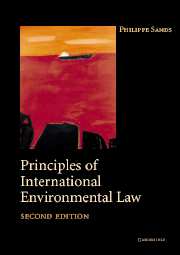Book contents
- Frontmatter
- Contents
- Foreword
- Preface and acknowledgments to the first edition
- Preface and acknowledgments to the second edition
- Table of cases
- Table of treaties and other international instruments
- List of abbreviations
- PART I The legal and institutional framework
- PART II Principles and rules establishing standards
- PART III Techniques for implementing international principles and rules
- 16 Environmental impact assessment
- 17 Environmental information
- 18 Liability for environmental damage
- 19 International trade and competition
- 20 Financial resources, technology and intellectual property
- 21 Foreign investment
- Index
17 - Environmental information
- Frontmatter
- Contents
- Foreword
- Preface and acknowledgments to the first edition
- Preface and acknowledgments to the second edition
- Table of cases
- Table of treaties and other international instruments
- List of abbreviations
- PART I The legal and institutional framework
- PART II Principles and rules establishing standards
- PART III Techniques for implementing international principles and rules
- 16 Environmental impact assessment
- 17 Environmental information
- 18 Liability for environmental damage
- 19 International trade and competition
- 20 Financial resources, technology and intellectual property
- 21 Foreign investment
- Index
Summary
Introduction
Improving the availability of information on the state of the environment and on activities which have adverse or damaging effects are well-established objectives of international environmental law. Information is widely recognised as a prerequisite to effective national and international environmental management, protection and co-operation. The availability of, and access to, information allows preventative and mitigation measures to be taken, ensures the participation of citizens in national decision-making processes, and can influence individual, consumer and corporate behaviour. Information also allows the international community to determine whether states are complying with their legal obligations.
Environmental impact assessment, addressed in chapter 16, is one important technique for acquiring environmental information. International agreements and practice have developed other techniques for ensuring that states and other members of the international community are provided with information on the environmental consequences of certain activities. Legal obligations developed with early treaty obligations requiring parties to provide information to the depository, or to other parties, on measures to implement commitments. Since then, environmental information has gradually emerged as a central issue of international environmental law. Principle 2 of the 1972 Stockholm Declaration called for the ‘free flow of up-to-date scientific information and transfer of experience’. The 1982 World Charter for Nature broadened the scope and extent of obligations relating to information, calling for the dissemination of knowledge of research, the monitoring of natural processes and ecosystems, and the participation of all persons in the formulation of decisions of direct concern to the environment.
- Type
- Chapter
- Information
- Principles of International Environmental Law , pp. 826 - 868Publisher: Cambridge University PressPrint publication year: 2003



